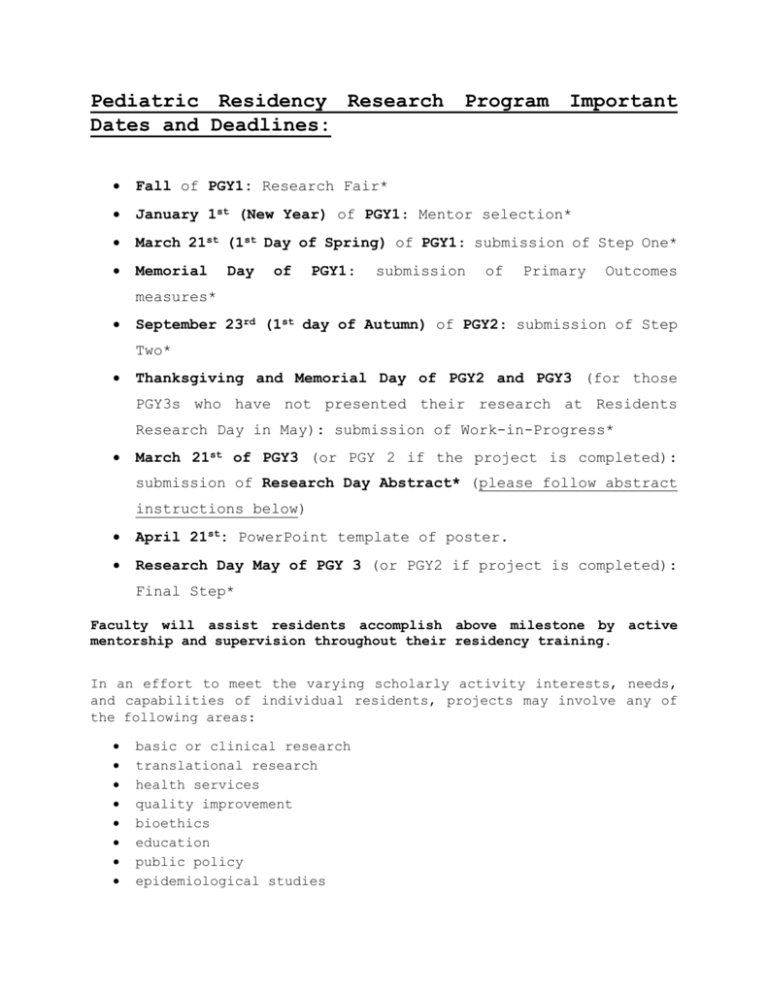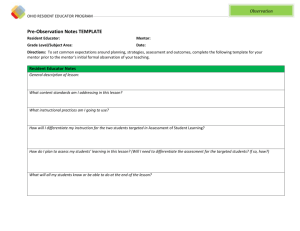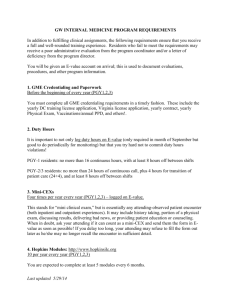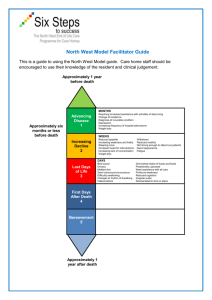Pediatric Residency Research Program Important Dates and
advertisement

Pediatric Residency Research Dates and Deadlines: Program Important Fall of PGY1: Research Fair* January 1st (New Year) of PGY1: Mentor selection* March 21st (1st Day of Spring) of PGY1: submission of Step One* Memorial Day of PGY1: submission of Primary Outcomes measures* September 23rd (1st day of Autumn) of PGY2: submission of Step Two* Thanksgiving and Memorial Day of PGY2 and PGY3 (for those PGY3s who have not presented their research at Residents Research Day in May): submission of Work-in-Progress* March 21st of PGY3 (or PGY 2 if the project is completed): submission of Research Day Abstract* (please follow abstract instructions below) April 21st: PowerPoint template of poster. Research Day May of PGY 3 (or PGY2 if project is completed): Final Step* Faculty will assist residents accomplish above milestone by active mentorship and supervision throughout their residency training. In an effort to meet the varying scholarly activity interests, needs, and capabilities of individual residents, projects may involve any of the following areas: basic or clinical research translational research health services quality improvement bioethics education public policy epidemiological studies case series (not case reports) Quality improvement (QI) projects of the scope that merits publication will count towards resident scholarly activity. However, if the QI projects apply only to local practices and cannot be generalized and published they could not count as resident scholarly activity. In addition, examples of acceptable activities might include a critical meta-analysis of the literature, a systematic review of clinical practice, a critical analysis of public policy, or a curriculum development project with an assessment component. During residency, all trainees will complete their CITI training and receive specific education in research and quality improvement methodology, project development and data management. **** Research Fair: established for PGY-1 residents and designed to introduce research opportunities within the department. This informal session will take place in the Fall of PGY-1 training and will serve as an open forum where residents will be able to interact with faculty and discuss possible research interests/topics. It is our goal that this session will familiarize the PGY-1 residents with faculty interests and stimulate them to think about their own research questions. Mentor Selection: a written declaration submitted by the resident to the Research Director listing their selected Mentor. Residents who do not have a mentor selected will be asked to provide a ranking list of potential mentors and associated projects. Mentors will submit a list of available projects and residents they would like to mentor. The results of the match will be announced by the end of January. Step One: a written declaration submitted by the resident to the Research Director listing their research topic selection, and is due in the winter of their first year (by March 21st). This declaration should be endorsed by the chosen mentor who from then on assumes responsibility for mentoring the resident. Step Two: a written narrative by the resident, with guidance by the mentor, describing the project plan in details, according to the IRBbased outline (attached) which will be evaluated by their peers (senior and junior faculty members). The peer review process will provide formal opinion about the project to the authors and will strengthen the IRB application/or research process. This step is due by the beginning of PGY2 year. Work in Progress: Residents will give brief periodic updates (power point) to their peers, mentors and faculty and receive feedback and assistance with their project execution that may involve the IRB application, data collection, data analysis, etc. These updates will be scheduled by the Resident Research Director. Primary Outcomes measures: PGY1 residents will submit their specific key measurement(s) or observation(s) that will be used to measure the effect of experimental variables in their planned study, or for observational studies; to describe patterns of diseases or traits or associations with exposures, risk factors or treatment. By that time it is expected that residents would have formulated a research question, searched for the best evidence in the literature, and critically appraised the existing evidence, and discussed all those steps with their mentor. Please note the primary outcome is different than study aim(s). Examples of primary outcomes (dependent variable) may include: pediatrician knowledge (measured by tests, or questionnaires), serum/urine levels of biomarkers, mortality, weight/height/BMI, prevalence of disease, severity of condition, etc. Research Day Abstract: word limit to 250 (not including names and affiliation), with either one table or one figure (optional), not to exceed one page total limit. Please follow the instructions below to submit an abstract: 1. The abstract should be an MS Word document typed single-spaced using 10 point type. The abstract's title should be typed in CAPITAL LETTERS and should clearly represent the nature of the investigation. The title should be followed in lowercase letters by the author's first and last names, degree, and affiliation (if different from our department). Underline the primary author's name (one primary author per abstract). Do not leave spaces between the title and the body of the abstract, or between paragraphs. The abstract file should be saved as: primary authors' last name_first word in the title (e.g., Zucker_Effects). 2. Please ensure that your abstract is the correct length and use 1" margins. 3. Use of standard abbreviations is desirable (e.g., RBC) as well as standard symbols for units of measure (e.g., kg, gm, mg, mL, L, and %). Place a special or unusual abbreviation in parentheses after the full word the first time that it appears. Use numerals to indicate numbers except to begin sentences. Do not need to use subtitles (e.g., Methods, Results). 4. Simple tables or graphs may be included; however, they must fit within the designated abstract space of one page. 5. Please use Times New Roman as the font. Body of the Abstract: organize the body of the abstract as follows: • Statement of the purpose of the study/program/project; • Statement of the methods used; • Summary of the results presented in sufficient detail to support the conclusion; • Statement of the conclusions reached. Final Step: the presentation of the “final” scholarly activity product in the form of oral and/or poster presentation at Pediatrics Research Day. In addition, it is expected that all residents will submit their work to a local/ regional/national meeting, or participate in a manuscript submission. Other Important Notes: Resident Advisor is different than their Research Mentor (see below) Mentor-Mentee: all prospective mentors list with their active IRB projects, publications and current funding are on file at the Department and available to all residents at any time. In general mentors are advised to avoid having more than two mentees unless they can fulfill their obligations of effective mentoring, as it is recognized that some mentors may have more mentees and have more projects than others, and that some projects are more complex than others. All mentors are encouraged to share their mentoring experience with all faculty during the research or WIP meetings. Project/research sharing: the project and authorship sharing could be allowed as long as residents formulate different research questions, and contribute equally in the project that shares common database/methods, etc. Those projects that address multiple questions on the same topic typically could be pulled into one manuscript with co-authorship. Resident Advisor: All residents will select an advisor at the beginning of their first year who is different than their Research Mentor. The Advisor role is more of “person to go to”, to discuss anything, career choices, research mentor choices, peers interactions, evaluations, etc.(see advisor documentation) Resident Advisors will be informed about the progress of Resident Scholarly Activities by both Resident Research Director and the resident. Research Curriculum Lectures and Sessions, along with faculty Research Seminars and Research Interests (compiled by Marian Evinger, PhD) are listed in separate attachments.








